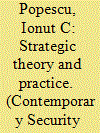| Srl | Item |
| 1 |
ID:
161760


|
|
|
|
|
| Summary/Abstract |
This article outlines the principles of a new conservative internationalism for the Trump era, and discusses how well the administration’s actions and words fit this paradigm. In order for Republicans and conservatives to reclaim their reputation as the party of strong national defense and competent foreign policy, current and future policymakers need to blend some traditional principles of conservative internationalist foreign policy with new adaptations required by challenging international security developments on the one hand, and changes in the domestic political views of right-leaning American voters on the other. A year into the Trump administration, there are some signs that the administration is indeed attempting to adjust slightly rather than replace the traditional principles of conservative Republican foreign policy, and therefore the “America First” grand strategy framework might become much more traditional in its actual policy decisions than in some of its rhetoric.
|
|
|
|
|
|
|
|
|
|
|
|
|
|
|
|
| 2 |
ID:
087331


|
|
|
|
|
| Publication |
2009.
|
| Summary/Abstract |
This study argues that the strategic planning process of the Long War on Terror has been conducted in a manner that did not pay sufficient attention to the tenets of classical strategic theory. The article shows that the strategy encapsulated in the National Strategy for Combating Terrorism and the Pentagon's initial responses to the challenges of irregular warfare departed from important principles associated with Clausewitz and other strategic theorists, undermining the prospects for successful counterterrorism. The reasons are partly the fault of the Bush administration, and partly a consequence of the American strategic culture and the preferred model of American civil-military relations. By turning back to strategic fundamentals, important improvements in strategic performance have been accomplished since 2006. The Obama administration can build upon the later successes of its predecessor in Iraq and in reshaping the US armed forces. In addition, the new president can refine and improve the Bush administration's counterterrorism strategy particularly by clarifying short- and long-term political goals. In order for this to happen, the new administration must do a better job of incorporating into its strategic planning main ideas from Clausewitzian strategic thought, such as the necessity for clearly defined political objectives in war and understanding strategy as first and foremost a process of employing military and non-military means in such a way as to achieve those political objectives.
|
|
|
|
|
|
|
|
|
|
|
|
|
|
|
|